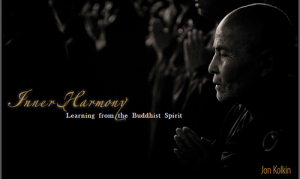Thoughts About Inner Harmony
The desire to be happy is intrinsic to human nature. The challenge is finding the most effective strategy for coming as close as possible to achieving this elusive goal.
Compassion is considered by the 14th Dalai Lama and others to be the cornerstone for achieving true happiness, i.e., Inner Harmony. Here, we define compassion as altruistic acts of kindness toward Mother Earth, one’s self, and all sentient beings. This book attempts to highlight the essential role that compassion, complemented by wisdom, mindfulness, gratitude, and healing of the mind, body and spirit play in achieving this desired state of wellbeing.
It should be emphasized that individuals who achieve greater inner harmony often live less stressful, healthier lives and are better positioned to be long-term, effective ambassador for non-violent conflict resolution, positive social change, and a thriving society.
Inner Harmony does not mean to suggest that this idealized state-of-mind is easily achieved. Nevertheless, it is realistic to think we can all strive to grow incrementally toward this improved state of inner balance. Furthermore, it is not the intention of this book to promote one belief system over another. Everyone has the right to choose his or her own path.
In this series, the term ‘inner harmony’ is synonymous with reaching a state of wellbeing, balance and equilibrium. That said, the word ‘harmony’, as used here, is not intended to imply one will experience a monochromatic existence, devoid of major obstacles and daily challenges. Instead, it is meant to suggest that by maintaining a healthy state-of-mind one is better positioned to view situations with discernment, make wise decisions, and increase the probability of achieving personal wellbeing while simultaneously making valuable contributions to society.
Wisdom improves the likelihood of being effective at formulating and implementing well thought out actions. Though wisdom can be enhanced by the accumulation of knowledge from books and other sources of information, reaching this higher state of intelligence necessitates the added ingredients of experience, a sense of our surroundings, intuition, an appreciation of different perspectives, creativity, and the suppression of ego, arrogance and greed.
Mindfulness is another attribute that goes hand-in-hand with compassion. Mindfulness implies staying focused, being present, being aware of our surroundings, and being in tune with our senses. Mindfulness helps us to accurately absorb and process internal and external information, thereby aiding us in making wiser decisions.
Gratitude for non-material things heightens one’s level of wellbeing. Identifying and appreciating these elements within our lives can help keep us centered as we prioritize what is of true value, thereby guiding our choices.
Healing of the Mind, Body and Spirit is of great importance. This process requires integrating compassion, wisdom, and gratitude into our daily lives, which can lead to greater physical and emotional health.
In summary, compassion, complemented by wisdom, gratitude, mindfulness and healing are essential for achieving true happiness. This state of Inner Harmony also enhances the probability of effective, long-term engagement in actions that benefit Mother Earth and all Her inhabitants.
The Science
Neuroscience research demonstrates that, at virtually any age, the brain is capable of being rewired (a feature known as neuroplasticity). This means that, with proper commitment, our minds can become more proficient in mastering the positive attributes mentioned above, thereby leading to greater happiness. However, as with any skill, ongoing practice is necessary in order to achieve long-lasting success.



